- Home
- Alice Hoffman
White Horses Page 2
White Horses Read online
Page 2
“Jesus Christ,” Silver said to Teresa. “Why don’t you invite the guy in? It’s a hundred degrees out there.”
Dina came into the room wearing a black cotton bathrobe dotted with a print of diamonds. Her wet hair was covered with a blue towel she had turned up like a turban. She ignored her children and went to the door as if she had been expecting a visitor; but she didn’t open it, instead she studied Bergen through the screen.
The detective found himself searching for the young girl in the photograph the man from Santa Fe had given him so long ago. In that photograph every feature had been dark and sweet, the flesh of youth, a pose kept still and pure. The woman at the door seemed less alive than her own image; the eyes Bergen saw now were stony, the mouth a thin pale line of doubt. When Bergen didn’t speak right away, Dina shifted the towel on her head. “What do you want?” she asked.
“Your father sent me,” Bergen said.
Dina narrowed her eyes. “I don’t believe you,” she said through the mesh. “Why should I?”
Teresa stood by her mother; when Bergen wiped his forehead with a handkerchief, Teresa stared at his skin—it was flushed red, bumpy with heat. “Do you want some lemonade?” Teresa asked the detective with a sudden surge of pity.
Dina turned and glared at her daughter. “He’s not interested in lemonade.”
“Actually,” Bergen said, “that sounds pretty good. Hot,” he explained. “Hotter than San Francisco by fifteen degrees.”
“We’re very busy,” Dina said to Bergen. “We don’t have time to talk to you,” she told him, as if he was a gypsy with a cart of medicine she had no use for.
Bergen lowered his voice; Teresa had to strain to hear him. “I’ve been looking for you for twenty years,” he told Dina.
When he offered his business card, Dina opened the door just wide enough for the card to be slipped inside. She examined it closely. “It took you all these year to find me?” she asked. “I don’t believe a word you’re saying.” She slipped the card back outside.
“Your father’s dead,” Bergen said softly. Dina didn’t blink an eye, although for a moment she felt weak in the knees, as if she might faint from exhaustion or heat. “I just wanted you to know he had been looking for you all this time.”
“Get away,” Dina said, fighting against the memory of her father, but all the same still remembering the heavy black shoes he wore on Sundays, the clear, dark eyes that gazed at the mesa beyond the city, the silence that followed him whenever he walked into a room.
“Dina,” Bergen said, tasting the name. “Do you mind if I call you Dina?”
At the kitchen table, Silver put down the polish and the boots. He noticed that his mother’s back was straight as wire, that Teresa was leaning forward, hypnotized.
“Get away,” Dina whispered as if Bergen were a ghost she could command, and wishing alone could force his flesh to dematerialize right there, on her own back porch.
“I was supposed to be looking for you,” Bergen went on. “But I never looked.” The family’s two dogs, who had been wandering around the neighborhood all night, now returned to the yard. Reggie, the older one, went to lie in the shade of the eucalyptus, but Atlas, the young collie, climbed the porch steps. He sat by Bergen’s feet and looked upward, as if he had known the detective forever, as if they were long-lost friends. Bergen put his hand on the collie’s head. “It was easy to find you, when I finally tried. I looked through the payroll lists of a couple of construction companies in San Francisco and found your husband’s name.” Behind the screen door, Dina was swaying, she was knee-deep in memories. Bergen took the opportunity to open the door and press his card back into her hand. “If you ever need me,” he told her.
Silver walked over and kicked the door shut with his bare foot. “You heard my mother,” he said to Bergen. “She told you to get out of here”
The collie grew skittish when he heard Silver’s raised voice; he carefully backed down the steps and hid under the porch. But Bergen didn’t flinch—he had seen Silver’s kind a thousand times before. Sometimes they were older, sometimes their faces were more lined by betrayals or scarred by knives, but they were the same sort: young men wanted by the wives they had deserted; boys who had stolen jewelry, or can, or an older woman’s heart; the kind who had cut right through somebody’s last longing for innocence, which appeared deceivingly in the form of tight blue jeans and desire.
“I was talking to your mother,” Bergen said easily.
“Are you deaf, or just stupid, old man?” Silver said, just as easily, but each word he spoke had the flare of violence at the edges.
“If your mother wants me to leave, then I’ll go,” Bergen said. As the detective spoke he didn’t bother to look at Silver; he wouldn’t have given two cents for that boy’s fate. He kept his eyes on Dina, and the more he looked, the more she seemed like the girl in the photograph, a girl so beautiful she herself seemed surprised.
“I want you to go,” Dina said slowly, though she was not at all certain of what she wanted at that moment—she had never expected such a moment to come, she had never imagined that her past would arrive in a Ford station wagon driven up from San Francisco on a hot afternoon.
“Now did you hear her?” Silver said, but the detective had already turned and was walking down the steps. Atlas came out from beneath the porch and walked with Bergen to the edge of the yard. “Just keep moving,” Silver called through the door when Bergen stopped to look back.
But Dina knew Bergen was still looking at her when he got into his car. She went to the sink for a glass of cold water, and saw him behind the wheel, staring across the road, across the garden, staring right at her. When he started the ignition. Dina closed her eyes.
Teresa pressed her nose against the screen door and watched the detective drive away. Then she turned to her mother. “Who did he say died?” she asked.
“Nobody,” Dina said, holding the glass of water to her forehead, remembering only then that she wore a towel wrapped around her damp hair, embarrassed that a stranger had seen her that way.
“The man in the jacket said somebody died,” Teresa said.
“Don’t be rude,” Dina told her daughter. “No one likes a girl who asks too many questions.”
When Dina went to comb out her hair and get dressed, Teresa sat at the table with her brother and examined Bergen’s business card. “I don’t care what she says,” Teresa said to Silver, “someone died.”
“Someone sure did,” Silver said. He pulled on his boots and admired the soft leather. “Our grandfather.”
“You’re making it up,” Teresa said. She knew there had been one grandfather—King and Renée’s father, a logger who had lived his last years north of Spokane, in a town so cold butterflies didn’t appear until the middle of June. But that grandfather had been dead a long time; he had lain in a bed with no sheets, struggling to push the breath out of his lungs. When Teresa was no more than a baby, the old grandfather in Spokane could no longer force the air in and out of his chest, and he had died before King Connors could drive up to pay his last respects.
“Didn’t you think we had another grandfather?” Silver asked. “Didn’t you think she had any parents?”
Dina had always seemed to walk without the faintest trace of New Mexico dust on her feet; she had never spoken of a mother, a father, a hometown, the heart that had captured her own and led her to California.
“This is just the beginning,” Silver said. “Watch out. Pretty soon, we’ll be orphans.”
When Silver went out to meet his friends behind the Texaco station on South Street, Teresa sat alone, wondering how much more she didn’t know about her family. She wished that Bergen would return with a briefcase full of charts, the facts of her mother’s life. But the street was empty now; on the back porch, where the detective had stood, there was a jay with one bent wing curled under his body. The two dogs threw back their heads and howled, even though there was just the shadow of the rising moon, and t
he day was still as hot as it had ever been, the heat waves had become a row of metal daggers growing taller than the trees.
Two weeks after Dina heard of her father’s death she still would not leave the house. Nothing King Connors could do would force her outside; she refused to hang the laundry on the line, instead she hung the wash in the kitchen, so that walking from the refrigerator to the stove meant navigating through rough white sheets. Dina also stopped working in the garden. Teresa did her best alone; she picked blueberries and watered the melons, but it was too big a job for one person, and soon she stopped weeding between the rows. Instead, she sat by the side of the house and watched the bees grow dizzy with pollen; she didn’t even yell when squirrels filled their cheeks with tomatoes.
Now that she was left to herself in the mornings, Teresa thought more and more about her mother’s family. But because Bergen didn’t return and no one else would talk about the past, Teresa decided to look for it on her own. On a Sunday when King Connors was out in the driveway working on his truck and Dina was asleep in her room with all the shades pulled down tight, Teresa found what she had been looking for. In the bottom drawer of the living-room bureau, beneath a stack of lace tablecloths and napkins, she discovered a photograph album. Teresa went to sit on the couch; in her hands the leather album felt like flesh. She held on tight to the heart of her mother’s past.
On every page were the faces of men and women who had lived year ago; there were adobe houses ringed with juniper trees, women dressed in cotton held up fans made of silk and mother-of-pearl. Teresa could see the smiles on those women’s faces turn into laughter, she was certain she could hear their lapdogs bark. She didn’t notice that Dina had walked into the room until it was too late. Dina grabbed Teresa and slapped her daughter’s face. She reached for the album, then opened the drawer and threw the photographs inside. When she turned back to Teresa, Dina’s face was hot.
“Don’t you ever look in this drawer again,” Dina said. She pulled Teresa up by her shoulders. King Connors came in from the driveway just as Dina was about to slap Teresa again. He held Dina’s arm tightly.
“You fucking crazy woman,” he said.
“Don’t talk to me like that,” Dina told her husband in the shrill quiet voice she used whenever violence circled over the living room like a cloud caught within the walls.
“She hit me,” Teresa said.
“You hit her,” King Connors said to his wife.
“Don’t ever curse at me,” Dina said. Her voice hissed like a ring of coiled snakes.
“Who did I marry?” King Connors said now. “Someone crazy. Someone who’s a fucking lunatic.”
“I was just looking at the photograph album,” Teresa said, afraid of what she might have started between her parents. “I’ll never do it again,” she added.
“The album,” King Connors said grimly. He went to the bureau and pulled out the bottom drawer.
“Don’t touch it,” Dina said, her words more like a curse than a warning.
King Connors smiled briefly before he threw the drawer. Slowly, the photographs Teresa had looked at slipped out; one by one they scattered across the floor.
“That’s mine,” Dina said, kneeling to retrieve the photographs.
“Yours?” King Connors said. “Nothing in this house is yours.”
Once a fight had begun between Dina and King there was nothing that could stop it, it would go on until someone was black and blue, until someone was hurt or cried out loud. Afterward, King Connors might go away for days, sometimes for weeks, not returning until whatever scars their fight had left seemed to have healed. Teresa sat as far back as she could on the couch; her spine felt as though the bones were held between long fingernails, twisted against the grain.
“Do you understand that nothing here is yours?” King Connors asked his wife.
“All right,” Dina whispered. She looked up from the floor where she sat; the tortoise-shell comb had fallen from her hair and strands fell onto her neck in long, wild threads.
“Why did you marry me?” King said to Dina. “You’ve been making us both miserable ever since that day.”
“I just wanted to know about the grandfather Bergen was talking about,” Teresa said. Dina looked over at her quickly, and Teresa grew silent immediately.
“Bergen?” King Connors said. “Bergen?” He tapped Dina with the toe of his boot. “Who the hell is she talking about?”
Teresa knew now that she had made a mistake in mentioning Bergen. She watched her mother bow her head, she listened as Dina stuttered when she spoke.
“My father hired a detective,” Dina told her husband. “He came here to tell me my father had died.”
“After all these years he came here now?” King Connors said. “You’re a liar,” he whispered. “Who’s Bergen?” he demanded.
“He’s a detective,” Teresa said.
“Did I ask you?” King Connors said to his daughter. “Who is he?” he asked Dina again.
“I already told you,” Dina said. “He’s just a detective. He was here for less than ten minutes, two weeks ago. I didn’t even let him in the door.”
“How can I believe you?” King Connors said. “Why didn’t you tell me about him before? Maybe you’ve got another man on the side and you’ve been putting me through this torture for nothing.”
Dina licked her dry lips with the tip of her tongue. “I didn’t want you to get all upset,” she said.
“Really?” King Connors said. “Since when have you ever thought about that?”
Anger poured out of King Connors in waves; he reached down and drew up a pile of photographs. “Your father,” he said to Dina. “He’s the one who made you think you were so much better than everyone else—the truth is—you’re not.” Smiling, King Connors tore the photographs in half. Dina looked at him, unbelieving, then she rose up, she gathered her skirts and ran to King Connors, she fell against him, her fingers at his throat.
“Oh no you don’t,” King Connors said. He loosened Dina’s grip, but by the time he threw her onto the floor, she had left her mark: King Connors’s skin was blue with the pressure of Dina’s fingers, lines of blood ran down his neck.
Dina crouched down low to the floor, she gathered the torn photographs together. Teresa watched as her mother tried to piece together the women in white, the wicker furniture, the dog who jumped up into the soft desert air, the old man who sat beneath tall cottonwood trees. But it was no use, the photographs were beyond repair. No glue could hold those ladies in summer dresses together, no tape could fix the torn June days.
“I’m sick of all this,” King Connors said. “Just sick.”
Dina had begun to weep; her tears coated the wooden floor with salt. Teresa had never seen her mother cry, not even when King Connors came home from the construction crew tired and ready for a fight if anyone looked at him a little too long. Dina had not cried when Reuben fell out of the eucalyptus tree and broke both his arms, she had not wept when her old cat was run over as it slept in the middle of Divisadero Street. This fight was different than any Teresa had seen before—more final, sadder, without the slightest trace of hope. But now Dina was out of control; she held the torn photographs and seemed not to realize that her voice rose higher and higher. Each sob became a shriek. Teresa put her hands over her ears. She wished she had never opened the bureau drawer, she wished she was a million miles away.
“I can’t stand it anymore,” King Connors said. He looked down at his wife. “I’m warning you,” he said hoarsely.
But Dina’s wails rose higher still, her voice rattled the windowpanes and drove King Connors into the kitchen. When he returned he carried a long carving knife in his left hand.
Teresa wished her brothers were home, especially Silver. Reuben might have calmed King down with a bottle of tequila and some lemons, but Silver would have protected them all, he would have dived for the carving knife. He would have been ready to rescue them from King, he would have been willing to figh
t. But that afternoon both brothers were at a roadhouse where the bartender was easily talked into selling six-packs of beer to minors who didn’t carry any false proof of age. Teresa was as good as alone because Dina was no help at all—when she saw King Connors holding the knife she threw back her head and laughed. She sat in the middle of the living room, torn photographs in her lap, staring King Connors right in the eye.
“Go ahead,” she urged her husband. “Kill me. Kill us all.”
Teresa believed that was exactly what King Connors planned to do. She closed her eyes. She prepared to die. But instead of seeking out flesh, King’s knife tore into the bureau. Again and again, over and over, he stabbed the drawer that had held the photo album. White scars lined the wood, white scars lined everywhere. When he was through, King Connors’s breathing grew easier, he stared sadly at his wife. “What’s the use?” he said. Then he went to sit in the easy chair next to the couch; he lit a Lucky Strike and when he tossed the match into a black marble ashtray he noticed that his daughter was staring at him.
“What are you looking at now?” King demanded. “Don’t you look at me that way,” he told her.
Teresa lowered her eyes—if she had tried to say one word she would have burst into tears.
“And don’t you turn away from me when I’m talking to you either,” her father told her.
Teresa didn’t know where to look; she locked her gaze and stared at the wall just behind her father’s head.
“Always look at me when I talk to you,” King Connors went on. King noticed now that his daughter was so thin that her bones nearly showed. She was trying to keep her legs straight, but her feet didn’t reach the floor, and just then his daughter reminded King of a small bird—a parakeet or a dove. King Connors backed down. “What the hell,” he said, more softly. “You’re okay. I didn’t mean any of that. Come on over here,” King Connors said. When Teresa didn’t move he pointed his lit cigarette at her. “Come on, I won’t hurt you.”

 The Story Sisters
The Story Sisters Local Girls
Local Girls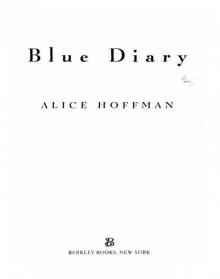 Blue Diary
Blue Diary The River King
The River King Here on Earth
Here on Earth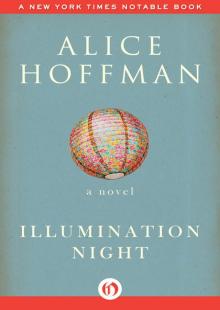 Illumination Night: A Novel
Illumination Night: A Novel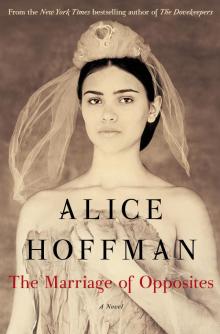 The Marriage of Opposites
The Marriage of Opposites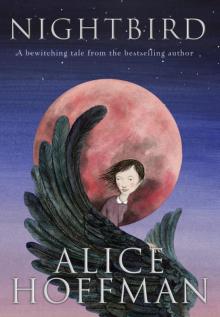 Nightbird
Nightbird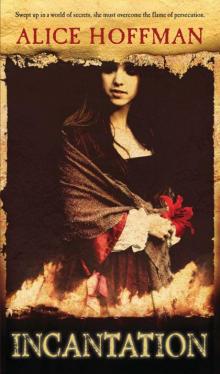 Incantation
Incantation Skylight Confessions
Skylight Confessions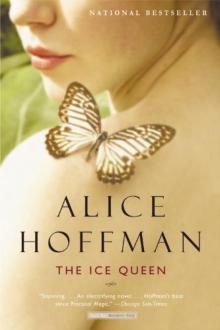 The Ice Queen
The Ice Queen Second Nature
Second Nature Fortune's Daughter: A Novel
Fortune's Daughter: A Novel Seventh Heaven
Seventh Heaven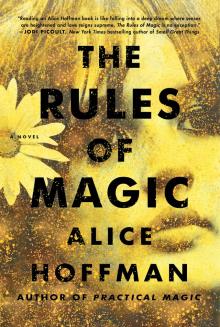 The Rules of Magic
The Rules of Magic The Red Garden
The Red Garden The Third Angel
The Third Angel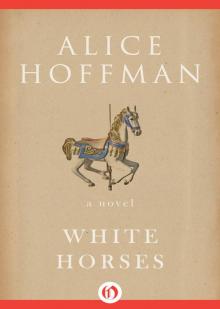 White Horses
White Horses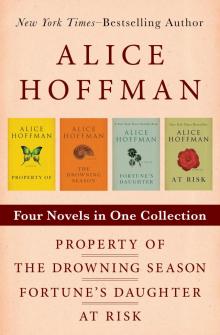 Property of / the Drowning Season / Fortune's Daughter / at Risk
Property of / the Drowning Season / Fortune's Daughter / at Risk Angel Landing
Angel Landing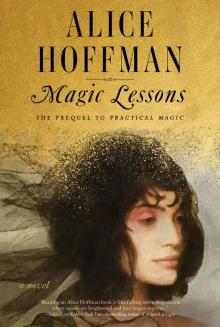 Magic Lessons
Magic Lessons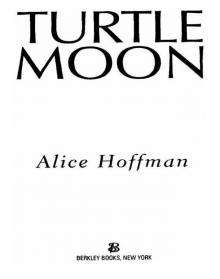 Turtle Moon
Turtle Moon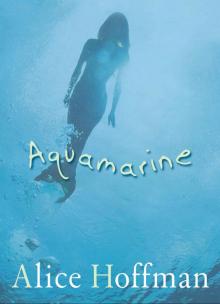 Aquamarine
Aquamarine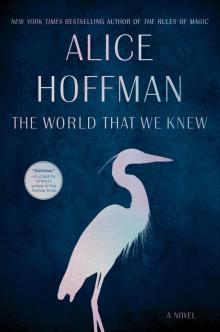 The World That We Knew
The World That We Knew Faithful
Faithful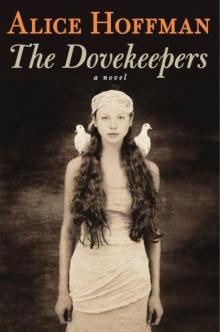 The Dovekeepers
The Dovekeepers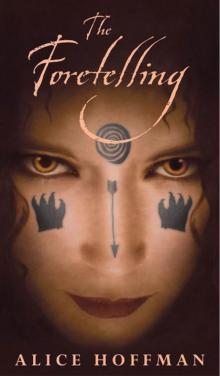 The Foretelling
The Foretelling Green Angel
Green Angel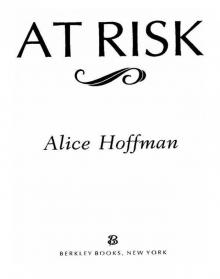 At Risk
At Risk Green Heart
Green Heart Fortune's Daughter
Fortune's Daughter Faerie Knitting
Faerie Knitting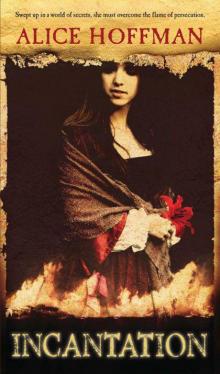 Incantation (v5)
Incantation (v5) Green Witch
Green Witch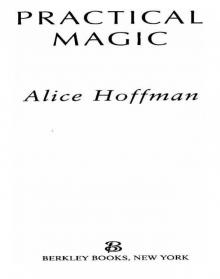 Practical Magic
Practical Magic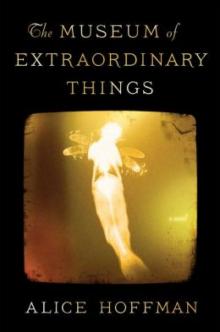 The Museum of Extraordinary Things
The Museum of Extraordinary Things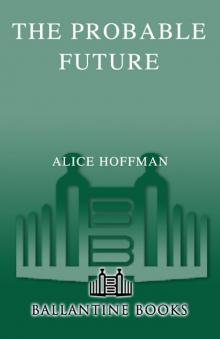 The Probable Future
The Probable Future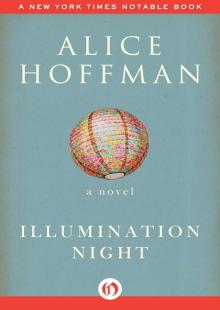 Illumination Night
Illumination Night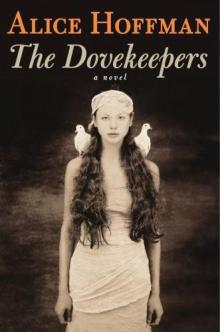 The Dovekeepers: A Novel
The Dovekeepers: A Novel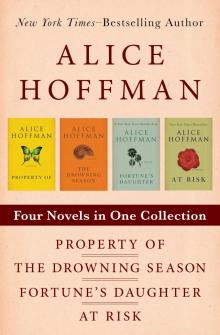 Property Of, the Drowning Season, Fortune's Daughter, and At Risk
Property Of, the Drowning Season, Fortune's Daughter, and At Risk